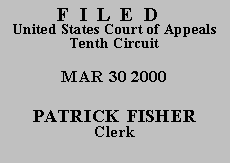

| LONNIE LEE ANDERSON, | No. 99-8093
(D.C. No. 98-CV-179-D) (D. Wyo) |
After reviewing Anderson's application for a certificate of appealability, his brief, and the record, we conclude that the district court correctly determined that the petition is time-barred. Anderson was sentenced on October 17, 1995, and failed to appeal, therefore his conviction became final upon the expiration of 30 days. See Wyo. R. App. P. 2.01(a). Because his conviction was clearly final before April 24, 1996, Anderson had until April 23, 1997 to file a habeas petition pursuant to 28 U.S.C. § 2254. See 28 U.S.C. § 2244(d); Hoggro v. Boone, 150 F.3d 1223, 1225 (10th Cir. 1998). Anderson, however, filed his petition for a writ of habeas corpus on July 10, 1998, more than a year after his time to file expired. Although the one-year period can be tolled while a petitioner pursues state post-conviction relief, these tolling provisions will not apply when a petitioner does not pursue such relief until after the one year period has expired. See Allen v. State of Oklahoma, No. 99-6033, 1999 WL 492804, at * 1 (10th Cir. July 13, 1999) (refusing to toll the one-year period while Petitioner pursued state post-conviction relief when he did not seek such relief until four months after the one-year period of limitation had expired). Thus, because Anderson did not pursue state post-conviction relief until October 2, 1997, over five months after the one-year period of limitations had expired, his application for state post-conviction relief did not toll the one-year limitations period.
Furthermore, Anderson has failed to set forth any legitimate basis for equitably tolling the running of the limitations period. We have previously stated that a petitioner must diligently pursue his claim before we will apply equitable tolling. Miller v Marr, 141 F.3d 976, 978 (10th Cir. 1998). Anderson has offered no explanation for the untimely filing of his petition for writ of habeas. We therefore agree with the district court that Anderson's petition is untimely, and conclude that the district court properly refused to address the merits of Anderson's habeas corpus petition. Accordingly, we deny Anderson's application for a certificate of appealability. Moreover, because we find that Anderson's appeal is frivolous and fails to present a substantial question, we deny his motion to proceed In Forma Pauperis.
The mandate shall issue forthwith.
ENTERED FOR THE COURT
David M. Ebel
Circuit Judge
*.After examining appellant's brief and the appellate record, this panel has determined unanimously that oral argument would not materially assist the determination of this appeal. See Fed. R. App. P. 34(a)(2) and 10th Cir. R. 34.1(G). The case is therefore ordered submitted without oral argument. This Order and Judgment is not binding precedent, except under the doctrines of law of the case, res judicata, and collateral estoppel. The court generally disfavors the citation of orders and judgments; nevertheless, an order and judgment may be cited under the terms and conditions of 10th Cir. R. 36.3.
1. Although the district court did not act on the issue of a certificate of appealability, the certificate of appealability is deemed denied by the district court pursuant to this court's General Order of October 1, 1996. See Tenth Circuit Emergency General Order of October 1, 1996.